Black Thought is one of Hip Hop’s most respected MCs, known for his hard-hitting bars and intricate wordplay — but while his skills behind the mic are likely God-given, he tapped into the repertoires of a few rappers early on to help him hone his craft.
During a promo run for his new book,
“My Top 5 has always revolved around my foundation,” The Roots frontman told DX. “What I’m about and so much of what I do — my style of storytelling — is in honour of that from which we came, that from which I came; so it’s always a nod to the foundation in that way.
“If I’m Black Thought and the reason I call myself Black Thought has something to do with the painter’s palette and the colors that go into — all the different nuance that goes into creating even the color black, then my Top 5, seven, 10 is going to represent my primary colors.”
Going on to break down in detail the MCs that make up his “primary colors,” the first name Black Thought reeled off was Juice Crew legend Kool G Rap, who he praised for his technical ability and “expansive vocabulary, like the breadth of knowledge that he was able to incorporate into his storytelling.”
“I could kick Kool G Rap’s rhymes, from ‘Poison’ or ‘Men at Work’ or ‘Road To Riches’ forever — and these are songs that are already 35 years old,” he said while commending the Queens, New York rapper for his “timeless” skillset.
For his second pick Black Thought stayed within the walls of Marley Marl‘s Juice Crew collective, opting to shine a light on one of Eminem’s favorite wordsmiths, Big Daddy Kane.
Selecting him for “some of the same reasons” as his first pick, the Cheat Codes rapper called Kane “the antithesis to a G Rap.” “Big Daddy Kane was far more stylistic than technical, or just as stylistic as he was technical, and he was smooth, right? He was a smooth operator,” he explained.
“What both Kane and G Rap, and also Rakim, brought to the table was a different cadence that we hadn’t heard before — that Shakespearean type ‘to be or not to be’ style … They all incorporated that Shakespearean thing, but in a different way.”
Returning to Rakim, he was third on Black Thought’s list because he “was the first one who was fearless enough to say, ‘I’m not gonna rap the way everybody else is rapping.'”
Highlighting how a lot of artists in the early-mid ’80s, specifically those on Def Jam, offered a “very intentional departure” from those that came before them, as far as their delivery and style went, Thought made sure to point out Rakim’s unique approach to lyricism and how it changed the game.
“Rakim was discovered by Biz Markie,” he explained. “Marley Marl was his producer just like Kane, Craig G and Masta Ace and all those other artists. But he refused to perform the way they did, and they laughed at him. They thought, ‘No one is ever gonna — you’re so monotone. It’s boring. You won’t even stand up when you’re recording your vocals. Why are you so shy?’
“He ushered in a new era — the era of MCs who approached their voice, their craft like you would view the mastery of a musical instrument. No MC [used] their voice like an instrument before Rakim. A lot of that had to do with his introversion, like his approach and the way he moved on stage and in the studio, but his creative approach was because he was himself a jazz musician and a student of jazz, and his older brother was a jazz musician and a student of jazz.”
He added: “Before he even knew he wanted to rap, he knew he wanted to do something where he was able to articulate himself in a way comparable to John Coltrane. So he was the first MC to really think about things in that way.”
His next pick was Public Enemy frontman Chuck D, who Black Thought said he was enamoured with because of his social-political commentary.
“Chuck was all activist, right?” he began. “His last concern was cadence and flow. He was just more about getting you the information, being on beat, grabbing your attention, smacking you saying: ‘Wake the fuck up.’ And that was a brave, again, stylistic decision to make at the time.
“I mean, these are kids, these are people who were 20. You know what I’m saying? To say, ‘Alright, this is the trajectory that I want my career to take. I’m gonna be political, I’ma be decidedly political, and I’m gonna be a voice for the voiceless.’ That’s heavy shit for young people, to sort of, you know, for that to be a path that you’re going to adopt and say, ‘My album is called It Takes a Nation of Millions to Hold Us Back,’ and to have songs like ‘Terminator X in the Hour of Chaos’ and ‘She Watch Channel Zero?!’, and you know, I mean, ‘Rebel Without a Pause.'”
He went on: “I was nine or 10 or however old I was when that stuff came out — maybe I was a little older. But yeah, it was still impactful in a huge way and Chuck D felt like a superhero. I felt like, wow, like that was my first time I heard somebody rapping that felt like, oh, this is what a superhero talks like, you know, if a superhero was to rhyme.”
Rounding out his selections, Black Thought took it back to Queens to give props to Hip Hop’s first legitimate solo superstar, legendary rapper, actor and business mogul LL COOL J, who he and the rest of The Roots toured with for a big chunk of 2023.
“He was so influential to me as a young person because I saw myself in him; we were so close in age,” Thought told DX. “When LL was making waves he was 14, 15, 16 years old, and just the legend of him coming to Philly and performing at the After Midnight club. There was a recorded audio cassette tape that I grew up listening to of him at 15 performing in Philly.
“That one LL freestyle influenced me and so many of my friends and what we do in such a huge way just because we were able to again, see just that representation — to see ourselves in somebody so young, who was in such a position of power and who was moving almost, you know, regally, like in regal grace. LL was the royal chief rocker but he was 16 years old, and he moved like a season veteran.”
Black Thought added: “And that’s something that, even having toured with him this summer, is authentic. That’s just who he is. He’s a class act. He’s always been legendary and that’s just the way he moves. That’s his stature … once you interact with him, it reveals itself to you. And it’s like, wow, he’s the real deal.”
It’s not just those that came before him that the Philly rapper has been showing love to recently. Just last week he gave props to a number of younger artists during an interview with his Roots groupmate Questlove on his Questlove Supreme podcast.
Namedropping Mach-Hommy and Your Old Droog, he talked about artist mentorship and how he shares demos with newcomers he respects. “I’m just able to, y’know, offer wisdom,” he said.
You can pick up a copy of .


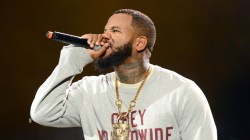
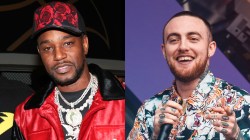
![Method Man Admits He Didn't Like Drake's "Wu-Tang Forever": "I [Wasn't] Getting On That"](https://hiphopdx.com/wp-content/uploads/2025/12/method-man-drake-wu-tang-forever-remix.jpg?w=250)
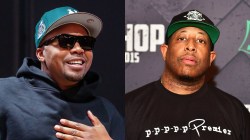
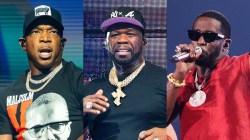
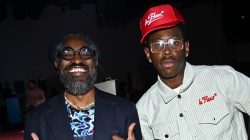
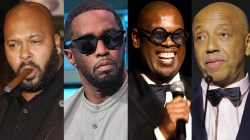
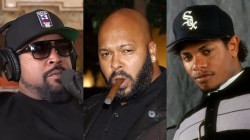
good article for the young folks to study – no lies on here